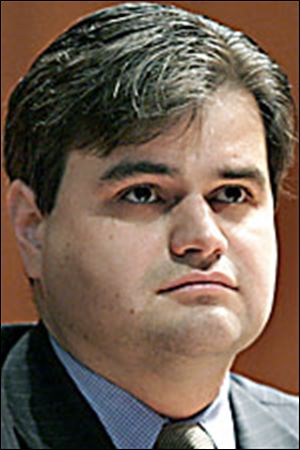
Toledo City Council president tells mayor rates shouldn’t be a burden
1/31/2013
McNamara
Potential mayoral candidate Joe McNamara called on Mayor Mike Bell to use an affordability study in setting the water rate increases for a coming upgrade in the city’s drinking water treatment system.
Mr. McNamara, a Democrat and president of city council, said care should be taken to make sure the new rates are not an excessive burden on citizens.
Mr. Bell, a political independent, said Monday in his State of the City speech repairs are overdue to the city water system, and he called on council to figure out what the new water rates should be.
The mayor said Wednesday, “I totally disagree” with Mr. McNamara’s proposal. He said the Ohio Environmental Protection Agency has told city officials, including Mr. McNamara, that it can’t delay beginning repairs to the water system.
Mr. Bell also said an “affordability study” has already been done. He said the state EPA calculated Toledo’s water rates as the fourth lowest in Ohio, which proves the city can afford higher rates to maintain its drinking water supply.
“We have a system that is obsolete. We have been placed on warning by the EPA. We don’t have time to waste on a study,” Mr. Bell said. He said he expects to present proposals for water rate increases within a couple of weeks.
Mr. McNamara held a news conference Wednesday in Government Center to explain his proposal.
He pointed out that water bills have already been increased, mainly to pay for the work required under the settlement from a lawsuit by the federal Environmental Protection Agency against sewage overflows into Toledo waterways.
Those rates were set after an affordability study was done in 2005 and updated in 2009 and in 2010 to determine the cost for the average Toledoan.
“Every member of Council wants faucets to run and toilets to flush, but no member wants to raise water rates beyond what is necessary,” Mr. McNamara said.
He said the updated study would provide objective information, including the rates paid by other water-related utilities.
“We have to be transparent with taxpayer dollars and transparent with the needs of the water system, while acknowledging what citizens can afford,” Mr. McNamara said.
He said he didn’t know what the cost would be.
Mr. McNamara advocated using the format of the affordability study that the city paid for in 2005 that was updated in 2009 and 2010.
Conducted by engineering contractor Tetra Tech, the study looked at Phase One of the Toledo Waterways Initiative.
The initiative is a $450 million, multiyear project mandated under a court-ordered settlement with the U.S. Environmental Protection Agency to end sewage overflows into the Maumee and Ottawa rivers.
Phase One was priced at $126 million, with the city’s 103,332 residential users responsible for 59.3 percent of the cost, at a cost per resident of about $724.
“Let’s update it and make it a part of the debate. I want data, facts, objective analysis as to what is affordable,” Mr. McNamara said.
In December, Mr. Bell told a council committee that the city was staring at a $257 million price tag to fix various components of the aging drinking water treatment plant.
The mayor successfully pushed annual water and sewer rate increases through in 2010.
He said previous city leaders ignored the need to raise water rates, which led to deterioration of the Collins Park Water Treatment Plant in East Toledo.